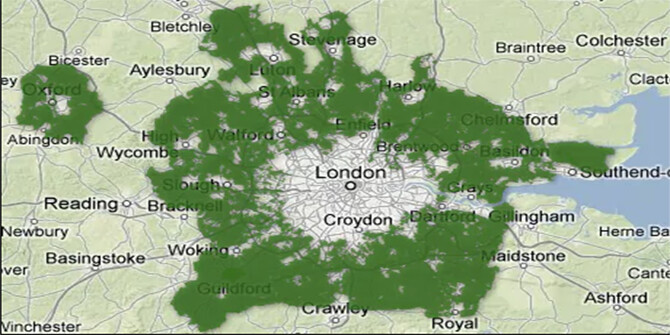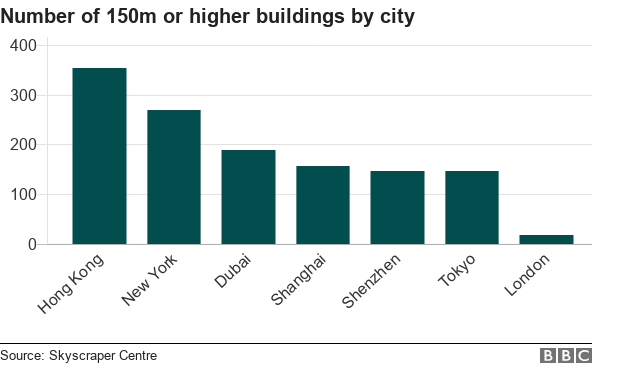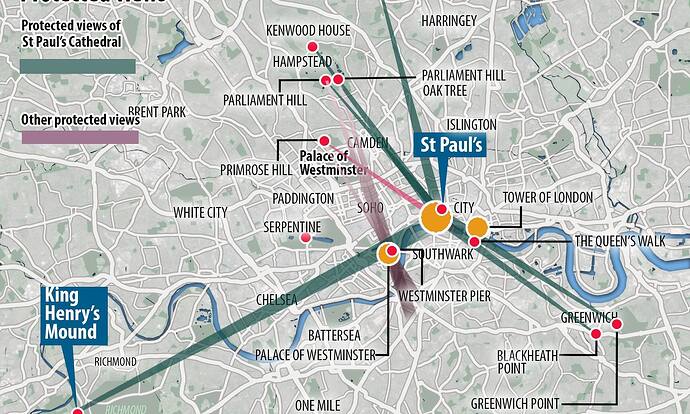Yeah, especially with interest rates (cost of the capital to the owner) being so low. Tax-wise probably also saving money (zero rental income). It’s probably still rare in CH, but that happens in many cities, own an empty apartment & just enjoy the capital gains. People renting your place / “clients” can be hassle, after all.
Don’t know about pension funds, possibly that they follow non-market incentives to some degree…
But since they are heavily regulated by govt. anyways, it would maybe make sense to regulate their allowed “Leerstehungsziffer”, possibly?
I think that empty real estate should always cost the investor more than renting it out. The tax incentives need to enforce that.
Well, there you go, that’s the typical poisonous rent control stuff, which restricts supply. Why, as a real estate owner, should I set the price according to some rules? Does it only apply to active rents, or to the new potential renters as well? If a developer finishes a building and releases a hundred of flats for rent, is he also limited during this initial offering?
4000 is really high and yet there are people in Zurich who still pay under 2000. I know, true liberalisation of this market would mean some serious gentrification of the city. Poorer people who occupied their flats for years would be pushed out to the suburbs and now they just enjoy the privilege which is basically financed by the real estate owners.
You guys keep forgetting that people are stupid (me included ofc.)
You raise rents? Soon we will be like in London, where it’s normal to share an apartment since it costs more than 50% of a normal wage or so… People will act like frogs in slowly boiling water (…i know…it’s not really true that thing). I’ve seen so many people not willing to change apartment because it’s too hard/difficult or “my friends all live nearby” (and then going out with them once a month and always by car…).
We are creature of habit and not so rational. So if you change and liberalize all, we will slowly be at London’s level or worse (South-East asian style).
In an ideal world, full liberalisation would work and I wouldn’t work in zurich but instead on another small city where other people (and my company) would have been. Instead we just sacrifice our life, everyone in different ways. (Hello 50min x2 pendler, I hope you enjoy your car).
I was checking out one of these a few years back.
The “trick” was that you have to contribute to the community - like cleaning, gardening etc.
So that’s where part of those rents might go - your time and work. ![]()
Not sure all are like that though.
If you don’t mind that, it can be a good deal.
Your example is kind of ironic. London is an excellent example of a city with incredibly illiberal housing policies.
It’s a prime example what happens with restrictive urban planning policies!
Just to give you a few examples, in London:
- you’re not allowed to build inside the green belt that encircles the whole of london
- you’re not allowed to build up, with some exceptions
- there are loads of “protected views”, where you’re not allowed to build anything that could obstruct the view on some historic sight
(Note that King Henry’s mound is 16km (!) away, and protects some silly historic view that you can see in the section picture below.)
So you’re not allowed to build up or sideways, which will obviously lead to an extreme undersupply of housing and in turn an increase in housing prices.
I still don’t get it. Does the Genossenschaft step in in place of the investor, developer, rental agency, or maintenance company? A regular developer will have to pay salary for its employees and will distribute the return to its shareholders.
Since here the shareholders are the residents (you pay the buy in of 8-20k), should I understand that this potential income is kind of paid back to them, effectively lowering their rent? If that’s the case, then being a shareholder of a rental property developer should be a gold mine. For 8000 of capital you pocket 6000 annual income (monthly rent cheaper by 500)? This cannot be true, the numbers don’t add up.
Check out this quote:
Myrdal stated, “Rent control has in certain Western countries constituted, maybe, the worst example of poor planning by governments lacking courage and vision.”3 His fellow Swedish economist (and socialist) Assar Lindbeck asserted, “In many cases rent control appears to be the most efficient technique presently known to destroy a city—except for bombing.”
Just think about it, if you are a capital owner, will you invest in a city with rent control? I don’t think so. And if you own a building, will you renovate it, upgrade the standard of the flats? Hell no, people are paying the max price anyway and are killing each other to have this flat. So it will rot and you still will get paid, but you will not lay another penny. Obviously in Zurich we have had a lot of new investments and renovations, so the problem does not seem to be as severe, but I also have not fully understood how the rent control really works in Zurich.
Rent control is probably the one thing we can mostly agree on politically 
It’s not a product of sensible economic policies but mainly of NIMBY-ism and misguided social policies.
I just think of it that way:
Housing is a non-public good and an incredibly important one for peoples welfare. If something is that important, you want to ensure that it is profitable to produce it.
Thanks for the hinsight! I didn’t know that. I were mostly making that example for the end result. I didn’t know they were so f… up, other than the thing about properties belonging to the queen and all the other aristocratic b… (that somehow exsist here as well…)
So you can reach that end result with both liberal and illiberal imho.
Maybe because you can’t park money elsewhere? I don’t know.
If rent control is sufficiently near the “right” price, you invest because you are sure to find renters.
Nice one about London. I heard that in Tokyo the real estate market is quite liberal, which means the flats are relatively affordable. But due to the lack of control (the restrictions that you mentioned), the whole city looks awful (don’t know, haven’t been there), because everybody can build where and how they want.
So it’s always a compromise between providing affordable housing (and having ugly cities) or having nice looking cities (and expensive). Rent control will cause the chosen ones to pay less, and the rest will struggle to find anything at all…
Yes, that could be the case. I heard that pension funds are happy with 2% annual yield. That is some really low return on capital!
Again on the topic of current trends in terms of real estate sales and pricing: maybe there is someone working (or knowing someone else) in the area of mortgages able to say if recently:
- There are more mortgages given or at least more requests for mortgages?
- The average size of the mortgage is increasing?
The Genossenschaft is mostly the owner/developer, and also takes care of maintenance and have there own maintenance crew.
Well basically instead of giving the returns to some investor, the rents are lowered. The way you get into a Genossenschaft depends. The biggest one just asks for cash of 2 monthly rents. which makes you part of the Genossenschaft.
And yes returns on savings are pretty crazy, showing how much even rents seem to be inflated.
BTW they also advertise that they pay their maintenance employees above average salaries than somewhere else…
No, I really don’t ![]() please help. By the way, you call them societies. While “housing society” is a valid term, more popular is “housing cooperative”.
please help. By the way, you call them societies. While “housing society” is a valid term, more popular is “housing cooperative”.
I just wonder: if I pay 2000 in a co-op instead of 2500 to a regular landlord, where exactly are these 500 saved? Who gets less money? Does the bank/investor ask for lower interest? I doubt it, that would be weird.
Oh, and if there is no rent control when changing renters, then why do the landlords opt for extensive castings and screenings of candidates, instead of just raising the price?
I don’t understand your problem. If you buy a house and rent it, would you ask the exact amount of the mortgage + 1% for repairing costs or a bit more?
You’re right that landlords can increase rates more freely between tenants, but normally at most by 10%. Also you’re not allowed to charge “significantly more” than is usual in the neighbourhood. In combination with Swiss on average renting for quite a long time and landlords needing a good reason to cancel your tenancy this leads to a pretty restrictive pricing system (altough other countries are more restrictive ![]() ).
).
Maybe it was unclear, but I was just arguing for a “more liberal” housing market.
Building vertically is an obvious liberal answer to limited land supply. This can also lead to some negative externalities, but switzerland has such flat housing it would probably still be best.
Also there are maximum “Ausnützungsziffern”, which mean that often you are only allowed to build on a (sometimes small) part of zoned land. Which sometimes makes sense ( you wouldn’t want cities where no light hits the streets) but often leads to excessive land use (think suburbs with large lawns that most people don’t use).
Imagine that I own a block of 10 flats (maybe in full, maybe through mortgage) and you are one of my tenants. Each flat is worth 1’000’000 and I ask 2’000 for net rent (0.2% monthly, 2.4% annually).
Now imagine that you and the other 9 tenants form a cooperative. How does that change the equation? How are you suddenly going to be able to pay 1’500 per month? That’s what I want to understand.
Edit: maybe the idea is, that as a cooperative of 10 independent households, you’re able to get a good mortgage and buy the block from me and the rent is just about paying off the interest. I just read somewhere that cooperatives need to bring only 5-10% of their own capital, the rest can be financed.
I wonder, as a cooperative member, do you have any financial responsibility, should the cooperative run into trouble? Or do you just not care, like a regular tenant?
You are missing the part that they own the land, the flats and everything else. Check sunnige hof. (not linking them sorry). They own a piece of zurich. They got capital 50-100years ago and built houses. Now they have enough cash flow to keep going, as long as they know the tenants don’t trash their places, otherwise they might have cash issues.



